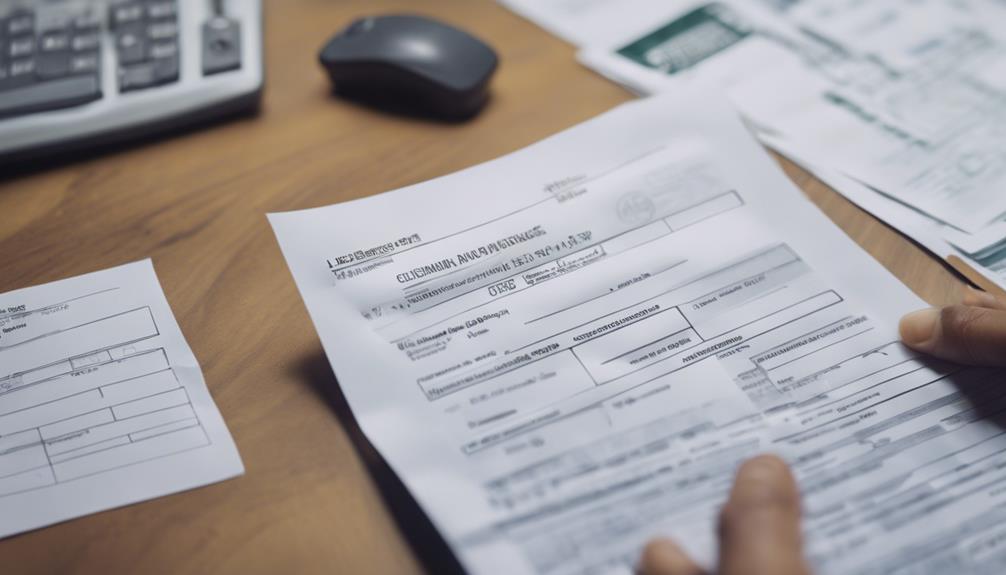Embarking on the journey of establishing your business in a new country is like setting sail on uncharted waters. As an international entrepreneur, you understand the importance of having a solid plan in place.
However, when it comes to navigating the complexities of business permits in a foreign land, it can feel like steering through a maze. But fear not, for with the right checklist in hand, you can confidently navigate the intricate process of obtaining essential permits for your business.
Let's explore the key steps together to ensure your venture sets sail smoothly and reaches its destination successfully.
Key Takeaways
- Conduct thorough research on required permits for legal operation.
- Ensure compliance with industry regulations to avoid penalties.
- Seek legal advice to navigate permit applications effectively.
- Stay proactive in renewing permits to maintain business continuity.
Legal Structure Selection
When establishing your business as an international entrepreneur, selecting the appropriate legal structure is crucial for ensuring both liability protection and favorable tax implications. The business structure you choose, whether it's a C Corporation, LLC, or partnership, will impact your ownership and management requirements, as well as your compliance obligations. Understanding the implications of each legal structure is vital to safeguarding your personal assets and optimizing tax efficiency.
Consider the level of personal liability protection you need and the tax treatment you desire for your business. Evaluate the flexibility, compliance obligations, and cost considerations associated with each legal structure before making a decision. Seeking legal advice or consulting with a business advisor can provide invaluable insights into the best legal structure for your international entrepreneurship journey. By taking the time to assess these factors carefully, you can set a solid foundation for your business and navigate the complexities of international business with confidence.
Choosing the Right Business Name

Selecting a distinctive and legally compliant business name is a critical step in establishing your international entrepreneurship venture. When deciding on the perfect name for your business, keep the following points in mind:
- Uniqueness and Distinguishability: Ensure that your business name stands out from others in your industry and location to avoid confusion and legal issues.
- Name Availability Search: Conduct a thorough name availability search to confirm that your chosen name isn't already in use or trademarked, protecting your brand identity.
- Descriptive Terms and Domain Name: Incorporate descriptive terms related to your industry to help customers understand your business better. Additionally, check the availability of your desired domain name to maintain consistency across online and offline platforms.
Understanding Visa Requirements
To start your journey into understanding visa requirements for international entrepreneurs, you should familiarize yourself with the different types of visas available. These include the E2, EB-5, L1, and EB1C visas. Each visa has specific criteria and application processes, tailored to different business needs and investment levels.
Visa Types
Understanding the visa requirements for different types of visas is crucial for international entrepreneurs looking to establish or expand their business presence in the United States.
Here are some key visa types to consider:
- E2 Visa**: Requires a substantial investment in a US company and is available to nationals of countries with E2 treaties with the US.
- EB-5 Visa: Demands a minimum investment of $500,000 in a new commercial enterprise and must lead to creating 10 full-time jobs for US workers.
- L1 Visa**: Allows the transfer of managers or executives from a foreign company to a US affiliate with specific requirements for the beneficiary's work experience.
Each visa type serves different purposes and has specific eligibility criteria tailored to meet the needs of international entrepreneurs like yourself.
Application Process
Considering the visa types outlined for international entrepreneurs, the next crucial step is navigating the application process, particularly in understanding the specific visa requirements that apply to your situation.
As business owners, meeting eligibility criteria and preparing the required documentation are vital before proceeding with the application. The application process can be complex, so seeking legal assistance or professional guidance is advisable to ensure all visa requirements are met accurately.
Obtaining EIN (Employer Identification Number)

When starting your business in the U.S., one essential step is obtaining an EIN (Employer Identification Number), a crucial nine-digit tax ID issued by the IRS. Here are some key points to consider:
- Tax Reporting: An EIN is necessary for fulfilling tax reporting requirements, ensuring your business is compliant with IRS regulations.
- Business Bank Account: You'll need an EIN to open a business bank account, separating your personal and business finances efficiently.
- Business Licenses: Applying for business licenses often requires an EIN, demonstrating your legitimacy and adherence to local regulations.
Securing Business Licenses

To legally operate your business and avoid potential penalties, securing the necessary business licenses is imperative. Depending on your business type and location within the United States, you may need various permits from different local government entities. Understanding the permit requirements for your specific industry is crucial to ensure compliance with the law. Failure to obtain the required business licenses can lead to fines, penalties, or even the closure of your business. Make sure to research and fulfill all necessary permit obligations to operate legally and smoothly.
Business Licenses Checklist:
| Type of License | Description | Issuing Authority |
|---|---|---|
| General Business License | Required for all businesses operating in a city | City or County Government |
| Professional License | Needed for specific professions or services | State Licensing Board |
| Industry-Specific License | Mandatory for certain industries or activities | Regulatory Agencies |
Registering With IRS for Taxes

Upon embarking on your journey as an international entrepreneur, the crucial step of registering with the IRS for taxes awaits your attention. To ensure compliance and proper reporting, follow these essential steps:
- Obtain an Employer Identification Number (EIN): As an international entrepreneur, acquiring an EIN is key for tax purposes, enabling you to report income and pay taxes to the IRS accurately.
- Determine Tax Obligations: Understand your tax obligations in the U.S. based on your business structure and activities. This knowledge will guide you in fulfilling your tax responsibilities effectively.
- Submit Necessary Forms: Different tax forms, such as Form 1040NR for non-resident aliens, may be required. Filing the correct forms ensures that you meet IRS requirements and avoid potential penalties.
Registering with the IRS as an international entrepreneur isn't just about taxes; it's about establishing a foundation for your business in a new market. Stay informed, meet deadlines, and maintain a good standing with the IRS to thrive as an international entrepreneur.
Applying for Work Authorization

You're ready to take the next step in establishing your business presence in the U.S. by applying for work authorization.
The visa application process, required documentation list, and seeking legal consultation are crucial points to consider when pursuing work authorization.
Visa Application Process
Navigating the visa application process to secure work authorization as an international entrepreneur is crucial for establishing your startup legally in the U.S. Here are key steps to guide you through this process:
- Understand the eligibility criteria required for work authorization.
- Prepare and submit all necessary supporting documents accurately.
- Await the approval of your visa application, which will determine your ability to work on your startup in the U.S.
Successfully completing the visa application process can lead to the approval of work authorization, allowing you to focus on building and growing your startup in a compliant and legal manner.
Required Documentation List
After successfully securing your work authorization through the visa application process, the next crucial step is compiling the required documentation for applying as an international entrepreneur. To ensure a smooth process, submit Form I-765 along with the necessary fees for work authorization. Include evidence demonstrating your eligibility, such as proof of investment and supporting documents like your passport, I-94 form, and proof of parole status. Follow the guidelines provided by USCIS meticulously to accurately complete and submit Form I-765. Remember to await approval from USCIS before engaging in any work activities as an international entrepreneur.
| Required Documentation | Description |
|---|---|
| Form I-765 | Submit with required fees |
| Supporting Documents | Passport, I-94 form, proof of parole status |
| Evidence of Eligibility | Proof of investment |
| USCIS Guidelines | Follow for accurate submission |
Legal Consultation Importance
Legal consultation plays a crucial role for international entrepreneurs seeking work authorization in the U.S., ensuring a thorough understanding of visa requirements and regulations. Consulting with an immigration attorney can help you navigate the complex state of immigration laws, guiding you through the eligibility criteria and documentation requirements essential for a successful work authorization application.
Here's why you should consider seeking legal advice:
- Avoid Costly Mistakes: An immigration attorney can assist in preventing expensive errors that could lead to delays or denials in obtaining work authorization.
- Ensure Compliance: Understanding visa requirements through legal consultation helps you stay compliant with the regulations, reducing the risk of legal issues.
- Smooth Application Process: With the assistance of an attorney, you can streamline the application process and increase your chances of obtaining work authorization efficiently.
Compliance With Industry Regulations

To ensure smooth operations and avoid potential setbacks, diligently understand and adhere to the specific industry regulations and compliance requirements relevant to your business sector. Obtaining the necessary permits and licenses is just the beginning; maintaining compliance with local, state, and federal regulations is crucial. By implementing industry best practices, you not only operate legally but also build trust with regulatory authorities. Stay proactive in staying updated on any changes to regulations that could impact your business. Below is a table summarizing key points to consider for ensuring compliance with industry regulations:
| Compliance Checklist | Description | Action |
|---|---|---|
| Permits | Identify required permits for your industry | Apply for and obtain all necessary permits |
| Licenses | Check for specific licenses needed | Ensure all licenses are up to date and renewed |
| Regulations | Review local, state, and federal regulations | Implement processes to comply with all standards |
| Best Practices | Adopt industry best practices | Regularly assess and update practices |
| Updates | Stay informed about regulation changes | Adjust operations to meet new compliance needs |
Renewing and Updating Permits

Ensure seamless continuation of your business operations by proactively managing the renewal and updates of your permits. When renewing permits, it's crucial to submit updated business information and financial documents to regulatory authorities. Be mindful that permit renewal timelines vary depending on the permit type and the agency's specifications. Failure to renew permits on time can result in penalties, fines, or even suspension of your business activities.
To navigate this process smoothly, consider the following:
- Stay Informed: Keep track of permit expiration dates and understand the renewal processes to prevent any disruptions in your business operations.
- Prepare in Advance: Gather all necessary updated business information and financial documents ahead of the renewal deadline to ensure a timely submission.
- Comply Diligently: Some permits may require regular updates or certifications to maintain compliance with regulations. Stay proactive in meeting these requirements to avoid any setbacks.
Conclusion
Congratulations, you're now ready to conquer the U.S. business world with your essential permit checklist in hand!
You've navigated the legal maze, secured your visas, and obtained all necessary permits.
Your business is poised for success, and the sky's the limit for your entrepreneurial journey.
Keep pushing forward and watch your dreams soar to new heights!